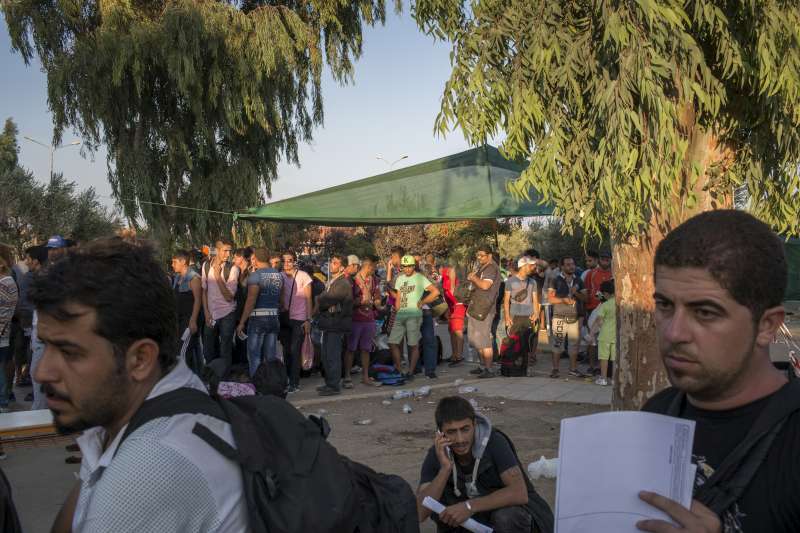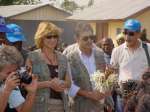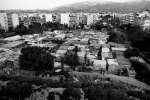Losing hope and fearful for their families, skilled Syrians join refugee exodus
News Stories, 28 September 2015
MYTILENE, Greece, Sept 28 (UNHCR) -- It's the picture-perfect image of a Greek island holiday. A solitary man enjoys his morning coffee on the sun-drenched terrace of a hillside hotel overlooking the blue Aegean. The Turkish coast shimmers in the distance. A herd of goats, bells tinkling, grazes nearby.
But this man is no tourist. He's a middle-aged Syrian doctor from Damascus who has just safely led his wife and three young children on a journey through hell.
"It was very difficult for us," said the doctor, his soft voice trailing off as his eyes filled with tears. "I'm sorry," he added, choking back the tears and raising two bruised and bloodied elbows. "I fell," he said without further explanation. No need. His tears and his visible wounds tell of other unseen and unspoken emotional and physical scars.
The doctor and his family are among some 370,000 people, more than 70 percent of them Syrian refugees, who have so far this year made the dangerous sea crossing from Turkey to the Greek islands aboard smuggler-supplied boats. For most, the voyage is seen as the last life-threatening obstacle they must face before finding safety in Europe. About 100 have died or gone missing this year in Greek waters during the crossing, many of them children.
Like the doctor and his family, most of the refugees and migrants arrive on the north shore of Lesvos between the towns of Molivos and Skala Skamnias, where the channel separating Greece and Turkey is narrowest. Once ashore, many of the exhausted but relieved refugees climb aboard buses for the 70-km trip to the island's capital, Mytilene. There, they are identified and registered by authorities at UNHCR-supported facilities before continuing their onward journey to the Greek mainland and beyond. Vulnerable families and individuals are identified by UNHCR and its partners and provided special assistance.
While awaiting their onward travel from Mytilene to Athens, the doctor, his wife and their three children -- two girls and a boy, ages 8, 10 and 12 -- found a hotel where they joined a few other Syrian families who had the money to pay for a room. Most refugees can't afford such luxuries. But UNHCR staff said they are seeing increasing numbers of affluent, highly educated Syrians leaving the country. Some are able to bring their money with them. Others are not.
In a former children's camp near Mytilene airport now run by volunteers as a shelter for asylum seekers, vulnerable families and individuals, Hamad*, his wife and two infant sons have spent the past two months in a small log cabin while they await the results of their Greek asylum application. Hamad, 42, is an electrical engineer specialising in cellular phone technology. He owned three electronics shops in and around Damascus, as well as three homes, including one in the country. Life was good. Now they are nearly destitute.
"All of our money is in an account in the Damascus branch of a Gulf-based international bank that has branches all around the Middle East," said Hamad, sitting in front of the small, tidy cabin they have decorated with flags, plants and a vegetable garden. "When we left Syria, I thought we would be able to withdraw our money at any branch of the bank, since it's international. But when I tried, I was told the only way I can get our money is to go back to Syria. I have three credit cards and I can't use any of them.
"I don't know what would happen if I went back to Damascus," he added, crossing his wrists as if handcuffed. For now, he is dependent on the kindness of others. But he vows to find a job, any job, once he is given Greek asylum.
The doctor said he was receiving financial help from relatives already outside Syria. The stay at the hotel, its balconies draped with the drying laundry of several newly arrived refugees, was allowing the family time to decompress after their harrowing trek from Syria.
As with Hamad and his family, it took the doctor and his wife more than four years before finally deciding to leave Syria in search of safety elsewhere. It is a risk assessment that millions of refugees will recognize. Do the dangers of remaining at home now outweigh the risks of fleeing through an active conflict area and resorting to ruthless smugglers to cross international borders to find safety?
For the doctor, the answer became resoundingly clear when his youngest daughter narrowly escaped being hit by a missile while riding on a bus near their Damascus home.
"If the bus had been a minute later, I would have lost my daughter," he said.
"We once had a good life in Syria, but now it is gone," said the doctor, whose father and siblings are all physicians. Now, most of his family and friends have left as well. "There is too much killing and death. What was I to do? Wait until one of my own children was killed? Then it would be too late. We had to leave now."
The doctor carefully weighed his options for leaving, but they were limited. As a Palestinian-Syrian, he tried but was unable to legally enter and stay in neighboring countries. He decided the family would flee through Syria to Turkey and then on to Europe, resorting to smugglers when needed.
"I don't like dealing with criminals, but it was the only way," he said, describing the smugglers as "very bad people."
The family traveled north from Damascus through Homs and Hama toward Turkey, at one point paying $500 to soldiers to allow them to cross an internal front line.
Once in Turkey, smugglers offered the family three options.
"They said we could go by sea, land or air, using fake passports," he said. "I'm not a criminal and don't want to do that. We decided to go by sea to Greece."
While the worst part of their journey is now over, the family still has a long road ahead in rebuilding their life in a new land -- possibly Norway.
"I never had any intention of leaving Syria," the doctor said. "But things just kept going from bad to worse, until we had no other choice. Now we must start over."
Ron Redmond, Mytilene Greece






































